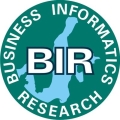12th Workshop on Information Logistics and Digital Transformation (ILOG 2021)
in conjunction with 20th International Conference on Business Informatics Research, BIR 2021
ILOG 2021 is the 12th workshop in a series which initially focused only on information logistics but extended the scope in 2017 to the neighboring topic of digital transformation. The mission of information logistics is to improve information flow in organizations by reducing information overflow and facilitating information supply that meets the demand of organizational stakeholders.
In recent years, many organizations are rethinking what customers value most and developing operating models that exploit the possibilities of big data, social media, artificial intelligence and other new technologies for competitive differentiation. This often leads to a digital transformation of large parts of the enterprise targeting seamless integration of digital services/products with digitized and optimized operations. Efficient and target-oriented information flows are a major contribution to digital transformation.
Knowledge-intensive industry and service sectors, public organizations and governmental bodies are dependent on accurate and timely information supply for efficient and high quality processes and services. Intelligent information supply has become an important issue that is characterized by just-in-time, demand-oriented and context-sensitive information. The digital transformation of organizations poses new requirements to optimized information supply and emphasizes the importance of information logistics solutions. In this context, we invite papers addressing these requirements and potential solution and we also encourage submissions addressing the use of semantic technologies, like ontologies, semantic nets, semantic web standards and other knowledge technologies. Such technologies and related methods have proven to be an important element of information logistics and solutions supporting digital transformation. Many information logistics applications wouldn’t be feasible without moving from data processing to also interpreting the meaning of this data.
The ILOG workshop aims to bring together people who have strong interest in digital transformation, information logistics, semantic technologies, information systems, enterprise solutions and knowledge-based systems. We invite researchers and practitioners from both industry and academia to submit original results of their completed or ongoing projects. We encourage broad understanding of possible approaches and solutions for information logistics and digital transformation.
Information Logistics
- Challenges in information logistics originating from digital transformation
- Showcases in digitization motivating information logistics or presenting solutions
- Practices of information logistics
- Experience reports about and showcases of information logistical applications
- Information logistics and knowledge supply in small and medium sized enterprises
- Organizational implementations of information logistics and knowledge supply approaches
- Internet-of-Things and information logistics
- Big data applications in information logistics
- Cyber-physical systems and information logistics
- Enterprise Architecture Management in the context of information logistics
- Literature surveys and systematic literature analyses
- Modeling of information processes and user demands
- Economic effects and relevance (business cases)
- Business models for just-in-time information supply
- Models for location and context
- Concepts for self‑awareness of information distribution
Digital Transformation
- Methods for digital transformation
- Application cases and case studies
- Challenges and success factors
- Practices and lessons learned
- Transformation of products and services
- Transformation of operations and business processes
- Literature surveys and systematic literature analyses
- Economic effects and relevance (business cases)
Semantic Technologies in Information Logistics and Digital Transformation
- Challenges of semantic technology use in information logistics and digital transformation
- Business ontologies, domain ontologies and application ontologies
- Application of ontologies in Enterprise Modeling
- Ontology Design Patterns
- Ontology engineering, ontology based systems engineering
- Experience reports about and show cases of ontology use
- Best Practices of ontology use
- Value modeling using ontologies
Submissions to ILOG 2021 have to be made by using the submission system EasyChair. All accepted workshop papers will be published in CEUR proceedings. A selection of best papers will be invited to submit paper extensions for a special issue of the journal on Complex Systems Informatics and Modeling Quarterly (CSIMQ). Papers submitted need to follow LNBIP formatting guidelines available from Springer.
Papers shall not have more than twelve pages (including figures, tables and appendices). Longer papers will not be included in workshop proceedings.
- Paper submission: Extended deadline August 4, 2021
- Notification of acceptance: August 22, 2021
- Camera ready submission: August 31, 2021
- Workshop: September 22, 2021
September 22, 2021
14:30 - 15:30 ILOG Workshop Session
1. Digital Innovation in Education: Perspectives, Opportunities and Challenges of Educational Open Data and Sensor Data
Mubashrah Saddiqa, Rikke Magnussen, Birger Larsen and Jens Myrup Pedersen
2. The Adoption Of Artificial Intelligence In SMEs - A Cross-National Comparison In German And Chinese Healthcare
Philipp Dumbach, Ruining Liu, Max Jalowski and Björn Eskofier
3. SismaDL: an Ontology to Represent Post-disaster Regulation
Antinisca Di Marco, Giordano d'Aloisio, Damiano D'Agostino, Giovanni Stilo and Francesca Caroccia
Program committee chairs
Kurt Sandkuhl, University of Rostock (Germany) (co-chair)
Ulf Seigerroth, Jönköping University (Sweden) (co-chair)
Birger Lantow, University of Rostock (Germany) (co-chair)
Program committee (preliminary)
Clara Bassano, University of Salerno (Italy)
Michael Fellmann, Rostock University (Germany)
Janis Grabis, Riga Technical University (Latvia)
Marite Kirikova, Riga Technical University (Latvia)
Birger Lantow, Rostock University (Germany)
Kurt Sandkuhl, University of Rostock (Germany)
Rainer Schmidt, Munich University of Applied Sciences (Germany)
Ulf Seigerroth, Jönköping University (Sweden)
Nikolay Shilov, St. Petersburg Federal Research Center (SPC RAS) (Russia)
Alexander Smirnov, St. Petersburg Federal Research Center (SPC RAS) (Russia)
Janis Stirna, Stockholm University (Sweden)
Matthias Wißotzki, Wismar University of Applied Sciences (Germany)
Alfred Zimmermann, Reutlingen University (Germany)

